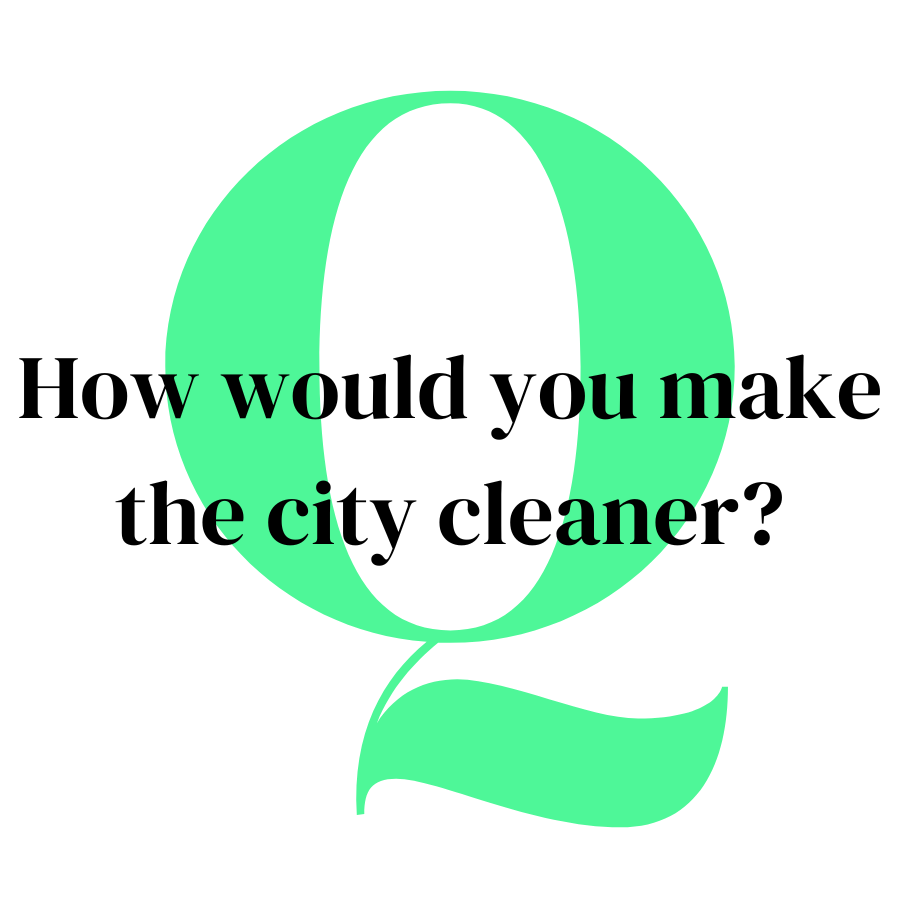Q: What would you do to help make the city feel less dirty, tackling the rubbish and dog poo all over the streets?
For me this one requires a top down and bottom up approach. From the top down we need to be allocating enough resources to ensure we’re setting a solid baseline for street cleaning and sweeping regimens that maintain a satisfactory level of care and cleanliness on our streets – and on all our streets, not just between the canals. Yes the city centre requires a heightened level of attention but we have busy urban centres beyond the canals that just aren’t getting the attention they deserve. Building upon the success of last year’s increase in street cleaning staff for the city centre, I want to see this staff expansion extended to our urban villages and suburbs. I believe that getting this very basic thing right would enhance the overall quality of life for residents and their sense of satisfaction with living in Dublin.
Once the resources are there, we need to start tackling the known root causes of much of our street litter: plastic refuse bags left out on the streets overnight to be torn asunder by wildlife, overflowing litter bins / a scarcity of litter bins, and, sadly, human behaviour.
I sat on the Climate and Environment committee during this council term so I’m well acquainted with the challenge and the stats on litter, but we’ve already identified some good solutions through pilot projects and these need to be rolled out more widely. The Bag Bin scheme, trialed in the city centre last year, should be rolled out to businesses and residents who don’t use wheelie bins – no one should be placing unprotected plastic refuse sacks on the street when we all know what’s going to happen to them.
I have also requested, supported and advocated for more and bigger litter bins across our communities and in parks and social spaces – I feel there’s been an attitude at executive level that if a litter bin attracts illegal dumping or residential waste you should get rid of it and that will eliminate the problem. It doesn’t, it just moves it somewhere else. I think, thankfully, that attitude is changing. Ultimately, I would love to see shared and underground bins, the kind you see in other cities, but I think it’s important that we continue to act on other, more immediate solutions in the meantime.
In terms of street litter, waste streams also need to be tackled at source, and I think with the introduction of the Deposit Return Scheme and the ban on single-use plastic products we’re going to see less of these items littering our streets, beaches and parks. I’d be supportive of the levy on single use coffee cups for the same reason and have had a motion agreed that licenses to sell tea and coffee in our parks should be contingent on providing reusable cups. I’ve also had water refill stations funded in three of our Kimmage Rathmines parks, and an agreement to provide them in libraries so people can use refillable bottles instead of buying plastic.
There are dumping blackspots that also need to be monitored and I hope we can soon start leveraging recently enacted CCTV powers to catch people fly-tipping and dumping.
To tackle the issue of littering and dumping (the human behaviour element) people need to feel there’s a realistic prospect of a fine. I would like to see more litter wardens and stronger enforcement measures, but I have also advocated for the creation of a new ‘community warden’ role – a visible presence on the streets, someone who could issue parking, dog-fouling, litter or other fines. I had a motion agreed that we would trial such a role, one on the north-side and one on the south-side, and I would continue to pursue this trial in the new council term. But there can be creative and community-led ‘bottom up’ solutions too – it doesn’ have to be all stick, no carrot. I’ve had the great fortune of working closely with the fantastic Crumlin Community Clean Up group over the last number of years, and supported by the council they’ve taken the approach of beautifying litter black spots, with really impressive results. I think there’s opportunity for peer-to-peer, community-to-community learning on issues like this, and it would support our circular economy objectives too.
The issue of dog waste sometimes feels like the problem without a solution, but every problem has to have a solution. More regular cleaning would of course get it off the streets quicker, but at the same time there’s a human behaviour element here that requires a multifaceted approach. We need an appropriate number of litter bins on dog walking routes and in parks, but we also need people to realise that not picking up after your dog is hugely anti-social, inconsiderate and just wrong. People should feel really ashamed if they do it. Effective signage, enforcement and fines will remain essential tools in curbing this problem, but we also need to look at solutions that have worked elsewhere, like a crowd-sourced mapping tool that had great results in Cambridgeshire.
As you can tell by the length of this response, working towards a circular economy and reducing waste is a big passion for me, and my vision for a cleaner Dublin would include the right mix of proven, proactive measures to tackle waste at source, improve our waste management, promote recycling and reuse, and ensure our communities are clean, enjoyable places to live.

